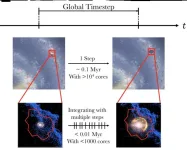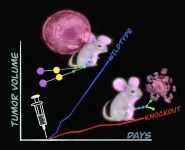(Press-News.org) A new study has found that it may be possible to use stimulants to treat stimulant use disorder. People with amphetamine-type stimulant use disorder who are treated with prescription psychostimulants such as methylphenidate and dextroamphetamine (commonly used to treat attention deficit hyperactivity disorder (ADHD)) may lower both their craving and stimulant use, especially if such treatments are administered at high doses. This study was led by Dr. Jutras-Aswad, a researcher at the CHUM Research Centre and a professor of psychiatry and addictology at Université de Montréal.
Although amphetamine-type stimulant (ATS) use disorder is a major global health issue, there is no established pharmacotherapy recommendation for its treatment.
“Not only is there no widely approved pharmacological intervention for ATS use disorder,” says senior author Dr. Didier Jutras-Aswad, “but the US Food and Drug Administration – the FDA – has just asked for feedback on its new draft guidance for developing treatments for cocaine, methamphetamine, and prescription stimulant use disorders. Many countries are looking to improve their approach to support people with such disorders. We hope our research can help guide the next wave of research and recommendations in this field.”
The study pooled the results of ten randomised controlled trials (RCTs) with a total of 561 participants, comparing the treatment of amphetamine-type stimulant use disorder with methylphenidate or dextroamphetamine to placebo. The effects of these drugs on reducing amphetamine use and cravings was modest across the ten RCTs, but Jutras-Aswad and his co-authors found that the effects might increase with higher dosage.
Methylphenidate and dextroamphetamine are commonly used to treat ADHD at maximum daily doses of 108 mg and 50 mg for adults. This research suggests that people with long-term high-dose exposure to amphetamines may require psychostimulant doses that are higher than the clinical recommendations for ADHD. Preferred treatments by people with ATS use disorders, optimal doses, and combination with other non-pharmacological interventions would need to be worked out in future studies.
The meta-analysis is published in Addiction.
-- Ends –
For editors:
This paper is available online after the embargo has lifted ( https://onlinelibrary.wiley.com/doi/10.1111/add.16347), or you may request a copy from Jean O’Reilly, Editorial Manager, Addiction, jean@addictionjournal.org.
To speak with senior author Dr. Didier Jutras-Aswad, please contact him via Communications Advisor Andrée-Anne Toussaint at the CHUM Research Centre by email (andree-anne.toussaint.chum@ssss.gouv.qc.ca) or telephone (+1 514 890-8000, ext. 23675).
Full citation for article: Sharafi H, Bakouni H, McAnulty C, Drouin S, Coronado-Montoya S, Bahremand A, Bach P, Ezard N, Le Foll B, Schütz CG, Siefried KJ, Tardelli VS, Ziegler D, and Jutras-Aswad D. Prescription psychostimulants for the treatment of amphetamine-type stimulant use disorder: A systematic review and meta-analysis of randomized placebo-controlled trials. Addiction. 2023. https://doi.org/10.1111/add.16347
Funding: This meta-analysis was supported by the Canadian Institutes of Health Research (CIHR) (grant number REN-181675), Université de Montréal and Centre de recherche du Centre hospitalier de l’Université de Montréal (CRCHUM). The study sponsor had no role in study conceptualization, data acquisition and analysis, interpretation of results, and manuscript drafting and editing.
Declaration of interests: CM has received scholarships from the Institut universitaire sur les dépendances, the Gaulin Foundation, the Centre Hospitalier de l’Université de Montréal Research Centre, and the Université de Montréal. SCM received financial training support from the Vanier Canada Graduate Scholarship. PB is supported by a Health Professional-Investigator Award from Michael Smith Health Research BC, the St. Paul’s Foundation, and the BC Centre on Substance Use. PB has no conflicts of interest to declare. BLF has obtained funding from Pfizer Inc. (GRAND Awards, including salary support) for investigator-initiated projects. BLF has obtained funding from Indivior for a clinical trial sponsored by Indivior. BLF has in-kind donations of cannabis products from Aurora Cannabis Enterprises Inc. and study medication donations from Pfizer Inc. (varenicline for smoking cessation) and Bioprojet Pharma. BLF was also provided a coil for a Transcranial magnetic stimulation (TMS) study from Brainsway. BLF has obtained industry funding from Canopy Growth Corporation (through research grants handled by the Centre for Addiction and Mental Health and the University of Toronto), Bioprojet Pharma, Alcohol Countermeasure Systems (ACS), Alkermes, and Universal Ibogaine. BLF has participated in a session of a National Advisory Board Meeting (Emerging Trends BUP-XR) for Indivior Canada and has been a consultant for Shinogi. BLF is supported by CAMH, Waypoint Centre for Mental Health Care, a clinician-scientist award from the Department of Family and Community Medicine of the University of Toronto, and a Chair in Addiction Psychiatry from the Department of Psychiatry of the University of Toronto. DJA receives study material from Cardiol Therapeutics for a clinical trial funded by the Quebec Ministry of Health and Social Services, and holds a clinical scientist career award from Fonds de Recherche du Québec (FRQS).
Addiction is a monthly international scientific journal publishing peer-reviewed research reports on alcohol, substances, tobacco, gambling, editorials, and other debate pieces. Owned by the Society for the Study of Addiction, it has been in continuous publication since 1884.
END
Treating amphetamine use disorder with stimulants: an encouraging new approach
2023-10-26
ELSE PRESS RELEASES FROM THIS DATE:
Does guideline-based treatment prevent racial disparities in cardiovascular outcomes?
2023-10-26
Philadelphia, October 26, 2023 – Cardiovascular disease remains the leading cause of death for women within most racial and ethnic groups in the United States. A new study in the Canadian Journal of Cardiology, published by Elsevier, characterizes the risk profile for black and nonblack women with obstructive coronary artery disease (CAD) enrolled in the Women’s Ischemia Syndrome Evaluation (WISE) cohort study. It concludes that racial and ethnic disparities in long-term cardiovascular outcomes were not observed among women ...
Genetic risks of autism and ADHD may be related to more screen time in children
2023-10-26
A team led by Nagoya University Graduate School of Medicine in Japan has investigated screen time in autistic (ASD) and ADHD children. Screen time refers to the amount of time a person spends on a device with a screen, such as a smartphone, computer, television, or video game system. The researchers found that children with a genetic predisposition to ASD were more likely to use screens for longer periods. Meanwhile, children with ADHD gradually increased their screen time as they grew older, even if their initial screen use time was short. They published their results in the journal Psychiatry Research.
People ...
Deep learning speeds up galactic calculations
2023-10-26
Supernovae, exploding stars, play a critical role in the formation and evolution of galaxies. However, key aspects of them are notoriously difficult to simulate accurately in reasonably short amounts of time. For the first time, a team of researchers, including those from The University of Tokyo, apply deep learning to the problem of supernova simulation. Their approach can speed up the simulation of supernovae, and therefore of galaxy formation and evolution as well. These simulations include the evolution of the chemistry which led to life.
When you hear about deep learning, you might think of the latest app that sprung up ...
Cancer's sweet Achilles heel
2023-10-26
Kyoto, Japan -- An old campaign slogan for cough syrup, "It tastes awful. And it works," seemed to imply that any sweet content might have diminished the medicinal effect.
Sweetness, in the case of cancer, appears as a chain of sugar molecules attached to proteins by beta1,4-galactosyltransferase-3, or B4GALT3 According to the Cancer Genome Atlas, a high expression of this enzyme is associated with noticeably shortened survival rates in several types of immunotherapy cancers, such as neuroblastoma, ...
Brain implant at OHSU successfully controls both seizures and OCD
2023-10-26
A patient at Oregon Health & Science University is the first in the world to benefit from a single stimulator implanted in the brain to effectively control two life-altering conditions: seizures caused by epilepsy and compulsive behavior caused by obsessive-compulsive disorder, or OCD.
Amber Pearson, 34, of Albany, said her seizures are under better control, but the relief from her psychiatric condition is profound.
“OCD is worse than having the seizures,” she said. “Epilepsy brings limitations to my life, but OCD controlled it.”
In the case study, published in the journal Neuron, co-authors from institutions across the ...
Brain injury expert says important changes still needed to law defining death despite reform pause
2023-10-26
After surveying the views expressed by 41 advocacy, medical, and transplant-focused organizations on the Uniform Determination of Death Act, a brain injury expert is calling for much-needed reforms to the legal definition of death in the United States. The recently announced pause by the Uniform Law Commission, which is spearheading revisions, is disappointing, the expert notes, but should not permanently stall practical fixes to longstanding problems with the Death Act.
“This study shows that most medical ...
Study examines racial differences in care among older Americans
2023-10-26
Older Black Americans are more likely to receive low value acute diagnostic tests than older White Americans, while older White Americans were more likely to receive low value screening tests and treatments, finds a study published by The BMJ today.
Low value care refers to services that provide little to no benefit yet have potential for harm, which can include laboratory tests, scans, and medication.
These differences were generally modest and were largely driven by differential treatment within health systems. But the researchers say the results “highlight ...
Industry payments to physicians linked to use of some non-recommended and low value drugs among cancer patients
2023-10-26
Patients with cancer whose oncologist receives payments from industry appear more likely to receive some non-recommended and low value treatments, finds a US study published by The BMJ today.
This finding raises potential concerns about quality of care, and the researchers say it may be appropriate to re-examine the current status of personal payments from the drug industry to physicians.
Research shows a consistent link between industry payments and prescribing behaviour, but whether payments to physicians have positive or negative consequences for patient care has not been evaluated empirically, say the ...
Hospitals accused of using foreign doctors as “cheap labour” in fellowship schemes
2023-10-26
English hospital trusts have been accused of using foreign doctors as “cheap labour” as part of fellowship schemes in which they can be paid less than trust-employed doctors and sent home if they become pregnant, an investigation by The BMJ has found.
Foreign doctors come to English hospital trusts as “fellows” as part of the Academy of Medical Royal Colleges’ Medical Training Initiative (MTI) scheme, explains investigations editor, Madlen Davies.
They work for two years in the NHS to gain experience that they will take back to their home countries afterwards. A proportion of fellows are sponsored, for example by their ...
Time to treat the climate and nature crisis as one indivisible global health emergency
2023-10-26
Over 200 health journals across the world have come together to simultaneously publish an editorial calling on world leaders and health professionals to recognise that climate change and biodiversity loss are one indivisible crisis and must be tackled together to preserve health and avoid catastrophe.
The authors say it’s a “dangerous mistake” to respond to the climate crisis and the nature crisis as if they were separate challenges, and urge the World Health Organization to declare this indivisible crisis as a global health emergency.
The editorial is published in leading titles from around ...

